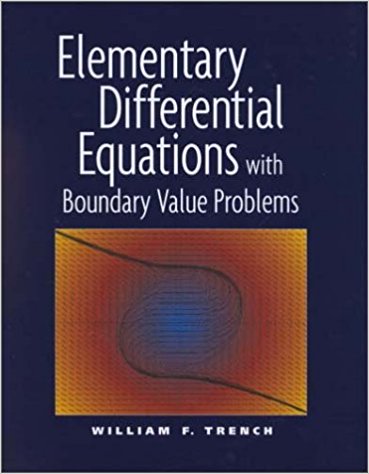
Elementary Differential Equations with Boundary Value Problems
This book is written for students in science, engineering, and mathematics who have completed calculus through partial differentiation. Readers should have some preparation in linear algebra.
Tag(s): Differential Equations
Publication date: 01 Dec 2013
ISBN-10: 0534263283
ISBN-13: 9780534263287
Paperback: 807 pages
Views: 15,603
Type: Textbook
Publisher: Brooks/Cole Thomson Learning
License: Creative Commons Attribution-NonCommercial-ShareAlike 3.0 Unported
Post time: 10 Mar 2017 03:10:00
Elementary Differential Equations with Boundary Value Problems
 This book is written for students in science, engineering, and mathematics who have completed calculus through partial differentiation. Readers should have some preparation in linear algebra.
This book is written for students in science, engineering, and mathematics who have completed calculus through partial differentiation. Readers should have some preparation in linear algebra.
Publication date: 01 Dec 2013
ISBN-10: 0534263283
ISBN-13: 9780534263287
Paperback: 807 pages
Views: 15,603
Document Type: Textbook
Publisher: Brooks/Cole Thomson Learning
License: Creative Commons Attribution-NonCommercial-ShareAlike 3.0 Unported
Post time: 10 Mar 2017 03:10:00
Share — copy and redistribute the material in any medium or format
Adapt — remix, transform, and build upon the material
The licensor cannot revoke these freedoms as long as you follow the license terms.
Click here to read the full license.
William F. Trench wrote:Elementary Differential Equations with Boundary Value Problems is written for students in science, engineering, and mathematics who have completed calculus through partial differentiation. If your syllabus includes Chapter 10 (Linear Systems of Differential Equations), your students should have some preparation in linear algebra.
In writing this book I have been guided by the these principles:
An elementary text should be written so the student can read it with comprehension without too much pain. I have tried to put myself in the student's place, and have chosen to err on the side of too much detail rather than not enough.
An elementary text can't be better than its exercises. This text includes 2041 numbered exercises, many with several parts. They range in difficulty from routine to very challenging.
An elementary text should be written in an informal but mathematically accurate way, illustrated by appropriate graphics. I have tried to formulate mathematical concepts succinctly in language that students can understand. I have minimized the number of explicitly stated theorems and definitions, preferring to deal with concepts in a more conversational way, copiously illustrated by 299 completely worked out examples. Where appropriate, concepts and results are depicted in 188 figures.
Tweet
About The Author(s)
William (Bill) Trench (1931-2016) was faculty emeritus and the former Cowles Distinguished Professor of Mathematics at Trinity University. Trench joined the Trinity faculty as the Cowles Distinguished Professor in 1986. He had previously served as professor of mathematics at Drexel University from 1964 to 1986. His main research interests were in linear algebra and ordinary differential equations. He was the recipient of multiple National Science Foundation (NSF) grants.

William (Bill) Trench (1931-2016) was faculty emeritus and the former Cowles Distinguished Professor of Mathematics at Trinity University. Trench joined the Trinity faculty as the Cowles Distinguished Professor in 1986. He had previously served as professor of mathematics at Drexel University from 1964 to 1986. His main research interests were in linear algebra and ordinary differential equations. He was the recipient of multiple National Science Foundation (NSF) grants.